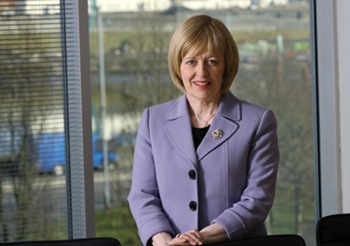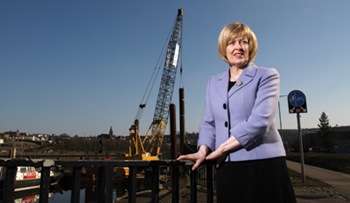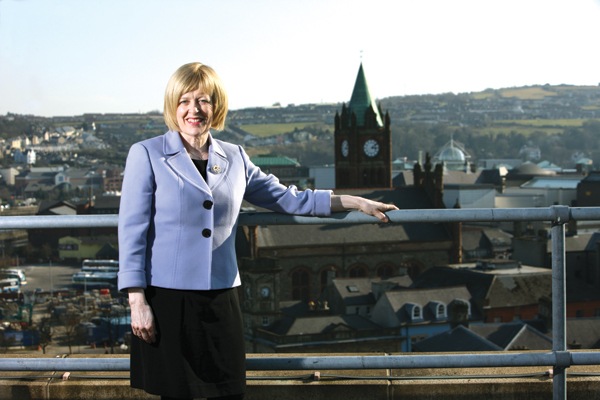A vision for Derry
Ilex Chief Executive Aideen McGinley updates Peter Cheney on its plans for Derry and how the City of Culture bid can help transform and deliver the regeneration plans for the city.
Born in the city and brought up in Strabane, McGinley has a strong personal connection to Derry and its regeneration. She took up the post of Chief Executive in September 2009, on secondment from the Department for Employment and Learning where she was Permanent Secretary. The urban regeneration company was itself formed in 2003 and is co-sponsored by OFMDFM and DSD.
“The purpose of the company is to champion sustainable economic, physical and social transformation in the city by creating a single regeneration plan with our partners in government and beyond, to develop the two former military sites, namely Fort George and Ebrington, and to construct the £13.5 million Peace Bridge.”
The opportunity to contribute to genuinely transforming the city was one of the factors that attracted her to the role, and she believes that central and local government can and want to join up to improve its future prospects.
This optimism comes from her involvement in the Future Search exercise for the city carried out last year. McGinley was impressed by the potential and the energy she saw during that process and felt that government and others could work together “in a genuine partnership” to meet the needs of those most disadvantaged.
“I know that sounds very theoretical but actually in practice it’s hard work. This hasn’t been an easy task,” she quickly adds, “but when you see our success in the City of Culture bid to date and the new Peace Bridge under construction this prize is worth the concerted effort.”
A review conducted by Ilex Chairman Sir Roy McNulty found that dozens of different plans for the city already existed e.g. for tourism, arts and economic development. The aim now is to develop one holistic plan for the city: “A lot of it’s been about relationship building and partnership building and what’s possible is so exciting.”
Future Search exercises bring together all the relevant stakeholders and the process involved gathering baseline statistics as well as embedding equality into the plans i.e. that regeneration is delivered in such a way that it benefits and provides opportunities for the most deprived groups in the city’s communities. Specific baseline research was carried out in the city’s most deprived wards and Oxford Economics also conducted a major econometric study.
Over 1,000 people are involved in developing the plan which Ilex aims to put out to public consultation in May. Ilex is working closely with the government, community and business sectors to create one plan and one vision for the city to 2020 and the process is starting to bear fruit.
“Government can undertake exercises that are right and the policies that emerge are the right policies but are they owned by the people who need to deliver them or the people who need to benefit from them?” explains McGinley.
Ownership
To date, there are 231 proposals on the table for the regeneration plan and Ilex is now working to prepare the first draft. The final version will be forwarded to the Executive over the summer, in time for the Comprehensive Spending Review.
As well as working out priorities, the document will consider how actions can integrate to “support, sustain and underpin” actions in other areas e.g. skills, literacy and numeracy’s impact on employment and enterprise, health and wellbeing, and so on.
Those taking part in the process realise that they have to prioritise to achieve a ‘step change’ in the city. They also realise that there is no point in going to government with a wish list; the plan has to be deliverable and an investment plan will be developed to fund the proposals.
“We know there is no money out there,” she remarks. “We’re realistic enough to know that we have to cut our coat according to the cloth but we think there are ways of doing things better and actually being able to deliver improved services within the current constraints that we all face.”
McGinley is heartened by the level of support from all sectors, including government, for the work on the regeneration plan and the City of Culture bid which have helped forge new relationships within the city and created an effective model of partnership working.
“It’s very exciting to be involved in the city at this point in time and I hope that what can emerge as a model of best practice here in Derry-Londonderry will actually be something that will be of benefit to Northern Ireland as a whole and communities elsewhere.”
 Projects
Projects
Ilex’s highest profile projects are the development of the new regeneration plan, the construction of the Peace Bridge and the development of the two former military sites, Ebrington (26 acres) and Fort George (14 acres).
It took almost 10 years to bring the bridge from its original concept to construction. With £13.5 million invested, it is starting to take shape with the piles rising from the River Foyle; completion is due by the end of the year.
“More importantly, as well as physically and metaphorically bridging the river, it’s about the opportunity to open up the whole of the Ebrington site to create shared space, to link the two banks of the river,” McGinley remarks.
The voluntary and community sector has also been involved, as seen clearly in the Caw/Nelson Drive area in the Waterside where local people repainted a paramilitary mural with a view of the Peace Bridge as part of a community project: “For the city, the bridge is a very important symbol of confidence and of moving forward.”
At Ebrington, with 14 listed buildings Ilex aims to create an ‘arts and cultural cluster’. The company hopes to bring an art gallery of national and regional significance to the site; supporters for this scheme include the Tate in London.
A strong military and maritime heritage will also be commemorated; the Honourable the Irish Society’s 400 years of records could be held there. Potential also exists for office space, a boutique hotel, restaurants, incubation units and social housing.
“It’s a very exciting project,” McGinley adds, with the City of Culture bid in mind. “The parade ground itself is larger than Trafalgar Square and would host events for between 12,000 and 14,000 people so it becomes one of the largest outdoor performing venues in Northern Ireland.”
Fort George, a brownfield site on the city side, is home to the telehouse for the Project Kelvin cable. Construction was in its final stages at the time of the interview and McGinley anticipates that this facility will place the city in the global market place in terms of technology.
With the changing economy, Kelvin gives Derry a “unique selling point” with fast, reliable and secure data transfer with spin-offs throughout Northern Ireland and the Republic.
“Our intention is to create a knowledge hub on the Fort George site that would play to the strengths of the North West. The university, for example, is already world-renowned for intelligent systems work and C-TRICS. We also have an excellent track record with companies such as Seagate and a number of world class software companies such as Singularity. The opportunities to develop these riches are there for the asking.”
City of Culture
McGinley highlighted the compelling story of the city, coupled with the talent of the people and infrastructure of venues and organisations, which has enabled Derry to be shortlisted for UK City of Culture in 2013. It is “tremendous” to reach the final four, alongside Sheffield, Birmingham and Norwich. The bid is being led by Derry City Council in partnership with Ilex and the Strategic Investment Board.
“This is a hidden gem,” she remarks. At DCAL, McGinley was involved in Belfast’s bid to be the European City of Culture, which brought £165 million in capital investment into the city. She points to the consistent investment in Derry’s venues and the calibre of its arts organisations.
Arts and culture can be enjoyed at the Millennium Forum, the Waterside Theatre, the Playhouse, the Verbal Arts Centre, Nerve Centre and An Gaelaras. Meanwhile, there is a huge cultural diaspora, including two Nobel laureates – Seamus Heaney and John Hume – a rich musical heritage, and award-winning artists Anthony Gormley, Willie Doherty and Seamus Deane.
“When you delve down, I think all of us, even though we thought we knew the city, were more than surprised at the actual talent and the linkages and the affection for the city,” she comments.
The bid is a fundamental part of the regeneration plan as the city has previously underperformed in a number of sectors, not least tourism and the arts: “We’ve got the product but we haven’t been effective in selling it.”
There is both a local and international side to Derry’s ambitions. Ilex’s research shows that in the city’s 10 per cent most deprived wards, 90 per cent of people had never attended an arts or cultural event. Therefore, a successful bid must connect the people and the communities in the city with their culture.
However, its supporters also want the city – and indeed region – to become internationally renowned as it was when the Field Day theatre company started there in the 1970s. Liam Neeson was among its ‘graduates’. Furthermore, the whole province’s creative industries and tourism offering can be showcased in this unique opportunity.
“This isn’t just Derry. It’s Northern Ireland presenting itself as a centre of excellence for culture and the support from artists and arts organisations throughout the island, North and South – and especially with London and the US – highlights the opportunity to connect with our diaspora.”
Through the bid its culture will be enjoyed and celebrated. But it will also create opportunities for purposeful inquiry. The city has obvious identity questions to answer: “It’s to explore the diversity and the richness of that diversity and to create a mature platform for the discussion of what the city is about that creates a unique story that others need to share and hear.”
While no money comes with the prize, there would be significant regional, national and international opportunities to showcase the city and Northern Ireland as a whole. Judges have given positive feedback to date and the final bid must be submitted by 21 May, followed by a presentation in June. The result will be announced in July.






